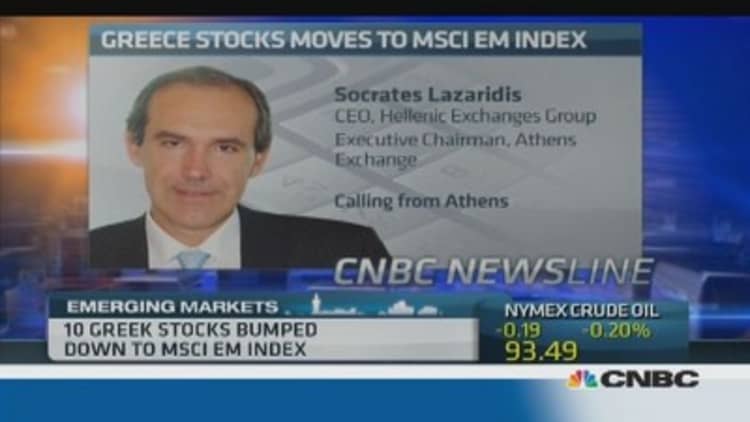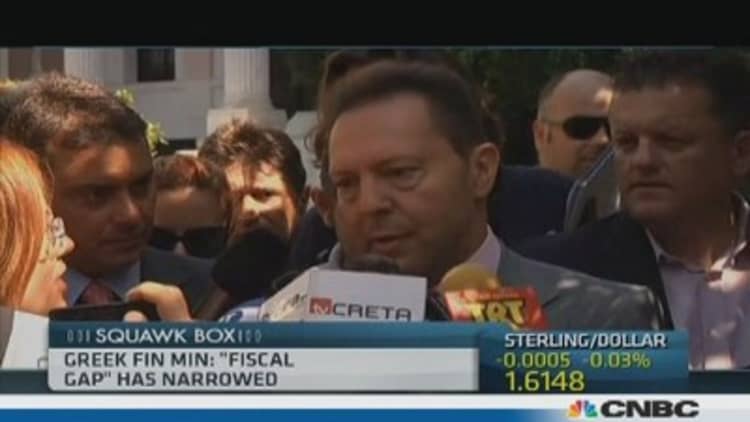
Greece formally lost its developed market status on Wednesday, with Greek equities moving into the MSCI Emerging Markets Index instead.
The move came after MSCI, a leading provider of equity indexes, said in June that the Greek index failed to meet criteria regarding securities borrowing and lending facilities, short selling and transferability.
It prompted fears that such a downgrade might drive away investors, but many analysts argue that the outlook for Greek stocks is now in fact a lot rosier.
(Read more: Emerging Market Switch Could Boost Greek Stocks)
"For the index-aware Developed Market investors, Greece has certainly been off the radar; it's been a small part of a large universe. There will certainly be more attention on this market now as a bigger part of what is however a smaller universe," Matthew Beesley, head of global equities at Henderson Global Investors told CNBC.
"Furthermore, for Emerging Markets managers, given some of the budget-deficit induced macro problems across their universe, Greece at least presents a different set of challenges", he said.
The MSCI Greece included just two companies: telecoms giant Hellenic Telecommunications (OTE), and OPAP, the recently privatized Greek gambling company, the biggest one in Europe.
With the move to emerging markets, more companies have gained access to the index. It will now comprise of ten stocks: Alpha Bank, Follie Follie, Hellenic Petroleum, Jumbo, National Bank of Greece (NBG), OPAP, OTE, Piraeus Bank,PPC & Titan Cement. The weighting of the index thus changed from 0.02 in the developed markets pool to 0.4 in the emerging market index.
This is the first time that the MSCI has downgraded a country from developed to emerging. In its annual market reclassification review, the MSCI checks criteria like economic development, size and liquidity, and market accessibility.
Greek stocks have been hit hard by the euro zone's debt crisis. The benchmark ASE lost fell 51.8 percent in 2011, and although it picked up in 2012, foreign investment inflows remained negative. In 2013 - with positive inflows - the ASE index is up 31.9 percent to date.
(Read more: From Developed Back to Emerging: Greece's Full Circle)

This year marks the return of net capital inflows from foreign investors; they had reached 1.9 billion euros ($2.57 billion) by the end of October.
"Investor confidence in Greece has grown. In October 71.69 percent of buys in terms of transaction value came from foreign investors. The average daily trading value reached 147 million euros during the current quarter (as of beginning of October). And 40 percent of the activity comes from banking stocks, which shows how interest in Greek banks has returned after the successful recapitalization program," Socrates Lazaridis, Chairman of the Athens Exchange and CEO of the Hellenic Exchanges Group said.
"The move to the emerging markets index has also increased foreign investors' interest and that is evident from the increase in visits to Greece from different funds to find out more about certain companies", he said.
Greece is in its sixth year of recession and is burdened with 240 billion euros in loans from the so-called Troika; the European Commission, the European Central Bank and the International Monetary Fund.
Unemployment in Greece has reached a record high of 25 percent, but other economic data has improved and an exit from the euro remains "unthinkable" for now, writes Michael Harris, an equity strategist at BofA Merrill Lynch, in a report.
(Read more: Greece's Recovery Coming – But at a Cost)
He says these improvements have been embodied by the recent Greek stock rally. "The index move has helped at the margin as plenty of GEM (Global Emerging Markets) investors are revisiting Greece, but as Greece is very small in GEM they would unlikely be doing so, were it not for a sense of Europe is improving and hope the worst is near over for Greece", he told CNBC.
The government last week submitted its 2014 budget and is hoping to achieve 0.6 growth in 2014 and a primary surplus of 1.6 percent of GDP, even though unemployment is expected to remain at all-time highs at 24.5 percent.
"The fiscal correction is progressing and a primary surplus is possible in 2013," wrote Deutsche Bank analysts in a report.
But "a gap in funding over the next few years needs to be addressed," they wrote. The Greek government has still not come to an agreement with its foreign lenders of how to plug this gap. A funding shortfall that has emerged for the second half of 2014 and disagreement over how much this will be had the Troika leave Greece last week to return to Athens in early December for further negotiations.
(Read more: Greek government prepares for another storm)
Follow us on Twitter: @CNBCWorld and follow Nefeli on @nefeliagk

